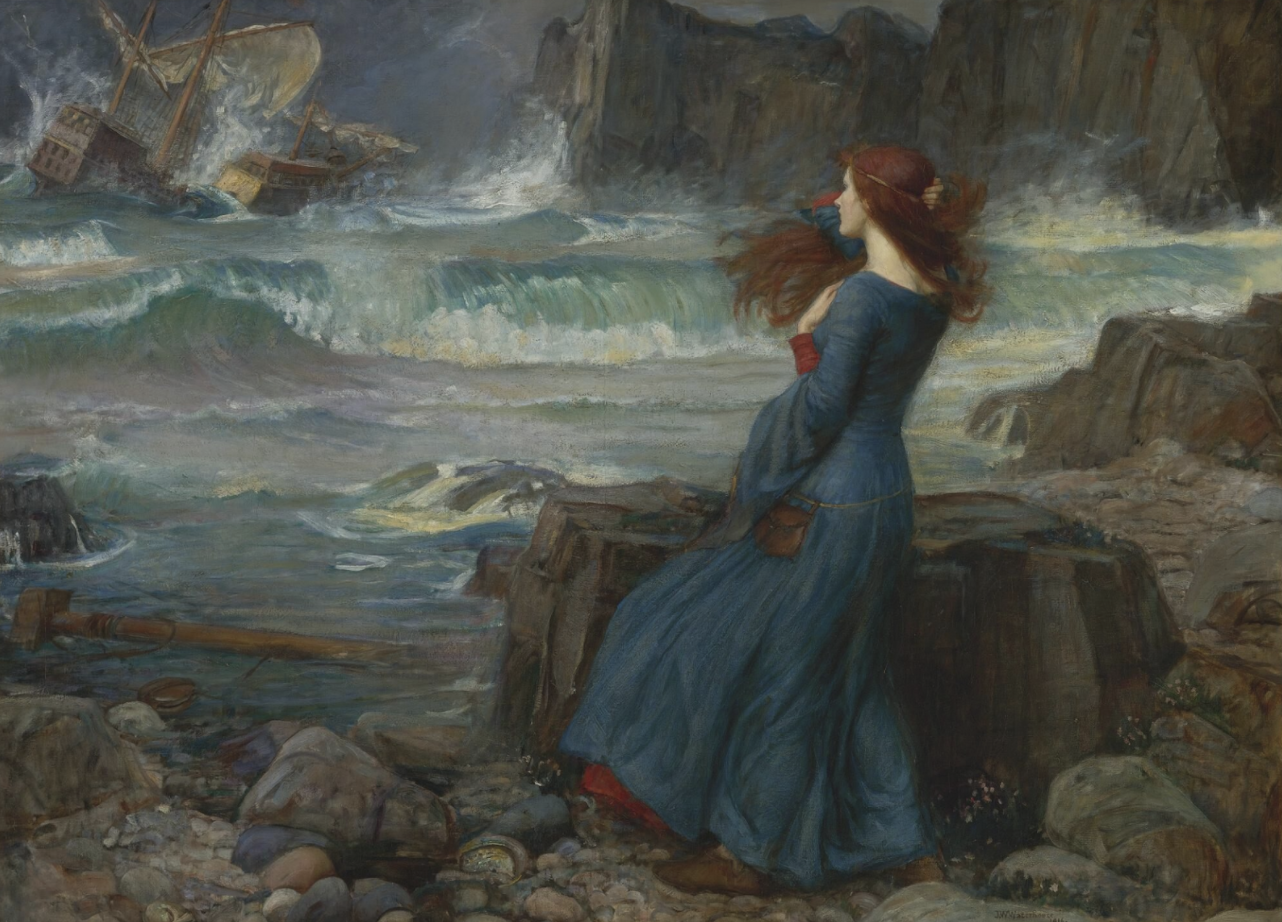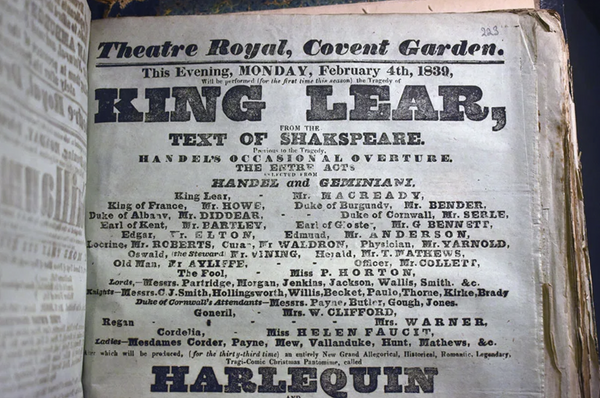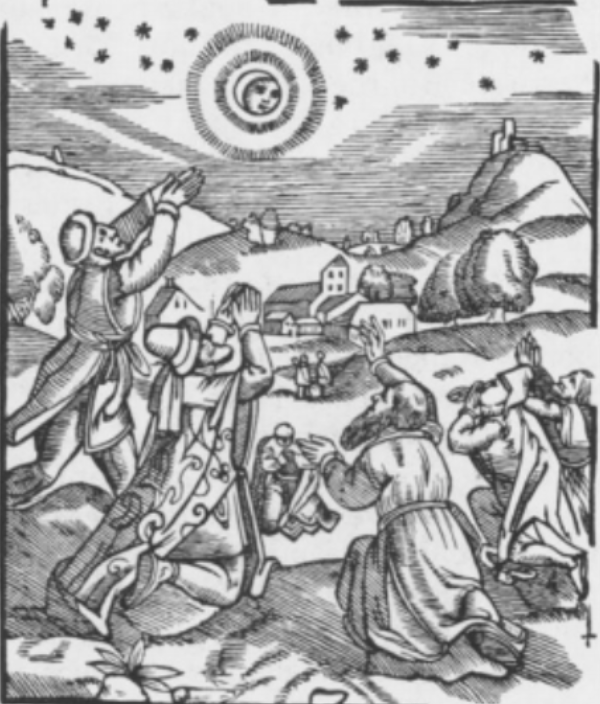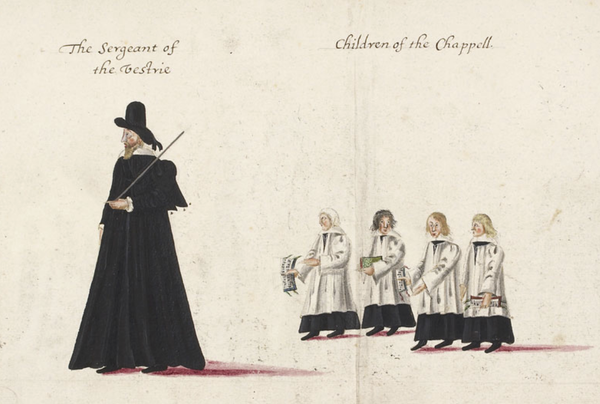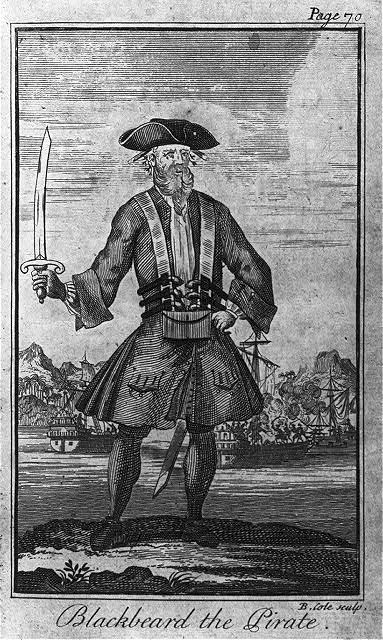Volume 26: April 22, 2021
Percy Shelley and The Tempest
By London Johns
According to a dialogue published in New Monthly Magazine in 1830, Lord Byron and Percy Shelley were walking together through the forest when Byron mentioned that he had been reading Hamlet, and he was disappointed by what he interpreted as the weakness and inconsistency of Hamlet’s character. Shelley disagreed, claiming that if Shakespeare was a genius and Hamlet one of his most famous plays, it had to contain artistry that neither Byron nor Shelley could comprehend. Shelley then began to read Byron a commentary that he had written on the subject. He read for so long that when Shelley looked up from what he had written, Byron was fast asleep. (M. Shelley [?] 1992) The source of this argument between Byron and Shelley is unknown; it was published anonymously, though Mary Shelley is one likely author. However, though the conversation’s legitimacy is uncertain, Shelley’s dialogue is a perfect example of his frequent praise of Shakespeare’s works, which he alluded to frequently in poems and letters.
Shelley’s letters displayed an admiration for Shakespeare’s works almost everywhere they were mentioned, and his respect for Shakespeare as a playwright extended even beyond Shakespeare’s works themselves. Though Shelley occasionally criticized Shakespeare’s plays, he did not criticize the author himself; when he read The Two Noble Kinsmen, he wrote to Mary Shelley that because the play lacked “moral discrimination and modesty,” he could “not believe Shakespeare wrote a word of it” (P.B. Shelley, The Letters Of… 619). In “A Defence of Poetry” Shelley classified Shakespeare—along with Dante and Milton—as “philosophers of the very loftiest power,” able to communicate “the truth of things” ( 27); Shakespeare’s characters were “living impersonations of the truth of human passion” (40). The only author whom Shelley ever placed above Shakespeare was Homer (Clark 262). It is ironic, given his praise of Shakespeare as a unique genius, that Percy Shelley wrote in a letter to Mary that she should not be discouraged because even “Shakespeare was only a human being.” (The Letters Of… 626)
Shelley’s works were alluded often to Shakespeare’s plays. In “Proposals for an Association of those Philanthropists”, Shelley quoted Macbeth: “Letting ‘I dare not’ wait upon ‘I would’ Like the poor cat ’n the adage” (qtd. in Clark 261). Two chapters of Zastrozzi also begin with quotes from Macbeth (Clark 261). The chameleons that feed “on light and air” in Shelley’s “An Exhortation” may allude to a line from Hamlet, though this is less certain. The myth that chameleons lived on air alone was mentioned in more than one of Shakespeare’s plays, but could also be found in some Romantic poetry. Only the previous year, Byron had written that the chameleon was the “airy child of vapour and the sun” (qtd. in Camarda 42). Hamlet eats “of the chameleon’s dish. I eat the air, promise-crammed” (3.2.100); Speed in The Two Gentlemen of Verona declares that “though the chameleon love/can feed on the air, I am one that am nourished by my victuals” (2.1.177-178). Shelley’s allusions to Shakespeare’s plays demonstrate that he had a detailed enough knowledge of Shakespeare’s works to use their quotations as a lexicon.
Of all of Shakespeare’s plays, The Tempest seemed to inspire Shelley most directly, lending characters to his poems as well as just quotations. His poem “With a Guitar, to Jane” placed Shelley in the role of Ariel and Jane Williams, Shelley’s close friend, in the role of Miranda. Jane could play several instruments, an ability which Shelley admired. He used the characters and format of The Tempest to describe the power of Jane’s music, which he linked to the natural world; her guitar could play “all harmonies/Of the plains and of the skies,/of the forests and the mountains” (The Complete Poetical Works 666). The poem even began with a stage direction: “Ariel to Miranda” (The Complete Poetical Works 665).
The Tempest influenced Shelley’s personal life as much as it did his poetry. A particular quote from the play seems to have followed Shelley during the year leading up to his death. In one of Mary Shelley’s journal entries from 1822, she wrote:
“Thursday, February 14.—Read Homer and Anastasius. Walk with the Williams’ in the evening.... ‘Nothing of us but what must suffer a sea-change.’” (M. Shelley 326)
The quotation in the journal entry was taken from the first act of The Tempest. The line belongs to Ariel, part of a song he used to lure Ferdinand towards Prospero by singing about his father, whom Ferdinand presumed to be drowned. Almost a year later, the context of Mary Shelley’s mysterious journal entry was revealed. She wrote a letter to her friend Maria Gisborne about a boat that Percy Shelley, Jane’s husband Edward Williams, and Shelley’s friend Edward John Trelawny had commissioned:
“A year ago Trelawny came one afternoon in high spirits with news concerning the building of the boat, saying, “Oh! we must all embark, all live aboard; we will all ‘suffer a sea-change.’” And dearest Shelley was delighted with the quotation, saying that he would have it for the motto for his boat.” (M. Shelley 326)
The boat to which Mary referred was initially named the “Don Juan”, after the poem by Byron. However, after Shelley became its sole owner, he replaced the piece of the sail upon which “Don Juan” was painted and renamed the boat the “Ariel” (M. Shelley 359). Choosing a boat’s name and motto from a play about a shipwreck may seem like an invitation for bad luck. Perhaps Shelley imagined the Ariel harnessing the powers that Prospero’s servant held over the sea. However, regardless of his intentions, Shelley’s interest in The Tempest would soon seem darkly prophetic.
On July 1, 1822, Shelley set out on the Ariel to visit a friend in Italy. The journey was idyllic; Shelley wrote, “we glide along this delightful bay, in the evening wind, under the summer moon, until earth appears another world. Jane brings her guitar…” (M. Shelley 363). A week later, Shelley began the return journey, accompanied only by Edward Williams and a boy named Charles Vivian. The Ariel set off into seemingly perfect weather, expecting to make the seven-hour trip without incident, but soon a merciless storm set in, and the Ariel disappeared into the center of it. Ten days later, Shelley’s body washed up on the beach, identifiable only by his clothes and a waterlogged copy of Keats’s poems shoved into his pocket (Holmes).
Trelawny was put in charge of arranging Shelley’s burial. Seeking a quotation that would allude to both Shelley’s talent and the circumstances of his death, chose the same lines from The Tempest that Shelley had picked to be the motto for his boat. Trelawny wrote to Mary Shelley to inform her of his choice, and she recalled the significance of that line:
“Do you remember the day you made that quotation from Shakespeare in our living room at Pisa? Mine own Shelley was delighted with it, and thus it has for me a pleasing association. Some time hence I may visit the spot which, of all others, I desire most to see.” (M. Shelley, The Life & Letters...Vol. II 75)
The song that provided Ferdinand temporary comfort—drawing him out of his miserable stupor and across the island in pursuit of Ariel—had a similar effect on Mary Shelley, who was in turn mourning a loved one lost to the sea. Retrospectively, it is not surprising that Percy Shelley was drawn to Shakespeare’s works. Shelley’s poems showed a Romantic reverence for the power of the natural world, an appreciation that transformed both his life and his death; many of Shakespeare’s plays treated nature similarly, especially The Tempest, in which man is subject to natural and supernatural forces that are at times indistinguishable from each other. Given the importance of Shakespeare’s works to the Shelley family, it is fitting that when Trelawny wrote to offer his assistance to Mary Shelley after her husband’s death, he included a quote from The Merchant of Venice: “My purse, my person, my extremest means/Lye all unlocked to your occasion.” (M. Shelley, The Life & Letters...Vol. II 80)
Works Cited
Camarda, Julie. "Keats's Chameleon Poetics, Or, the Natural History of "Ode to a Nightingale"." Keats-Shelley Journal, vol. 68, 2019, p. 40-71. Project MUSE muse.jhu.edu/article/771115.
Clark, David Lee. “Shelley and Shakespeare.” PMLA, vol. 54, no. 1, 1939, pp. 261–287. JSTOR, www.jstor.org/stable/458637. Accessed 16 Apr. 2021.
Holmes, Richard. “Death and Destiny.” The Guardian, Guardian News and Media, 24 Jan. 2004, www.theguardian.com/books/2004/jan/24/featuresreviews.guardianreview1.
Shelley, Mary Wollstonecraft. The Life and Letters of Mary Wollstonecraft Shelley. vol. 1 2, Richard Bentley & Son, 1889, Internet Archive, archive.org/details/lifeandlettersm02unkngoog/.
Shelley, Mary. The Life & Letters of Mary Wollstonecraft Shelley. Edited by Julian Marshall, vol. 2 2, Bentley, 1889, https://archive.org/details/lifelettersofmar02marsuoft/, archive.org/details/lifelettersofmar02marsuoft/.
Shelley, Mary (?). “Hamlet: Byron and Shelley.” The Romantics on Shakespeare, edited by Jonathan Bate, Penguin Books, 1992, pp. 335–349, archive.org/details/romanticsonshake0000unse/.
Shelley, Percy Bysshe. A Defence of Poetry. The Bobbs-Merrill Company, 1904, Internet Archive, archive.org/details/defenceofpoetry012235mbp/.
Shelley, Percy Bysshe. Letters Of Percy Bysshe Shelley. Edited by Roger Ingpen, G. Bell and Sons, 1914. https://archive.org/details/in.ernet.dli.2015.54181/
Shelley, Percy Bysshe. The Complete Poetical Works of Percy Bysshe Shelley, Including Materials Never before Printed in Any Edition of the Poems. Edited by Thomas Hutchinson, Humphrey Milford, Oxford University Press, 1914, Internet Archive, archive.org/details/completepoeticalshel/page/664/mode/2up?q=guitar.
Shakespeare, William. The Two Gentlemen of Verona. Edited by Barbara Mowat and Paul Werstine, Folger Shakespeare Library, The Folger Shakespeare, shakespeare.folger.edu/.
Shakespeare, William. Hamlet. Edited by Barbara Mowat and Paul Werstine, Folger Shakespeare Library, The Folger Shakespeare, shakespeare.folger.edu/.
Shepherd, Lynn. “'Full fathom five the poet lies': The death of Percy Bysshe Shelley.” Wordsworth, The Wordsworth Trust, 8 July 2014, wordsworth.org.uk/blog/2014/07/08/full-fathom-five-the-poet-lies-the-death-of-percy-bysshe-shelley/.
Waterhouse, John William. “Miranda-The Tempest.” Sotheby's, 24 Apr. 2009, www.sothebys.com/en/auctions/ecatalogue/2009/19th-century-european-art-including-orientalist-paintings-drawings-sculpture-n08542/lot.56.html.

